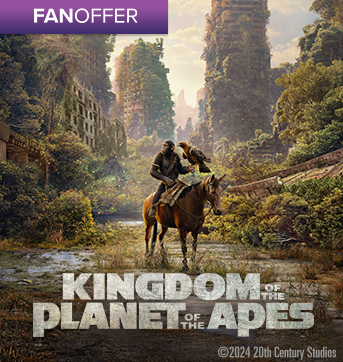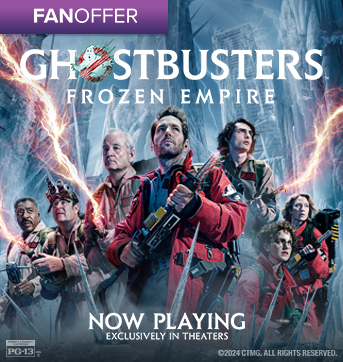 |
|
Turner Classic Movies has been carrying the torch for movie lovers ever since it first flickered onto television screens in 1994. Running back cinema history with no commercial interruption, the Warner Bros. Discovery-owned cable channel serves as a firm reminder that great movies never have an expiration date.
This month marks the institution’s 15th TCM Classic Film Festival, hosted in theaters across Los Angeles’ Hollywood Boulevard. TCM is screening more than 75 classic movies with the overarching theme of “Most Wanted: Crime and Justice in Film” from April 18-21. Here are 20 highlights from the festival program that feature special presentations or notable guest appearances, along with Tomatometers all recently updated with contemporaneous reviews by the Rotten Tomatoes curation team to best reflect how they were received in their own time.
Almost Famous (2000)
Tomatometer: 91%
Screening: Sunday, April 21 at Chinese Multiplex House 1 with makeup artist Lois Burwell in attendance.
Cameron Crowe had a life story fit for a movie. A born music geek who grew up in the halcyon days of rock and roll, Crowe broke into the field of rock journalism at the mere age of 16, touring with bands like the Allman Brothers and The Who. Eventually hanging up the journalist badge to take up Hollywood screenwriting, he kept his childhood adventures in his back pocket as a dream script. Coming off his wild success with Jerry Maguire, he finally moved his passion project to the front of the line.
The resulting labor of love was Almost Famous, one of the most critically adored gems of the year 2000. Not everyone was impressed; some critics grumbled that Crowe had sanded off the era’s rougher edges to present too cuddly a view of tour life. The majority consensus, however, was jubilant, with high praises sung for ensemble MVPs like Kate Hudson and Philip Seymour Hoffman. While the film was a box office flop, it found a resilient second life on home video shortly thereafter. Almost Famous’ make-up designer Lois Burwell will be a special guest at TCM Fest’s screening.
“The film shimmers with the irresistible pleasures that define Hollywood at its best — it’s polished like glass, funny, knowing and bright, and filled with characters whose lives are invariably sexier and more purposeful than our own.” – Manohla Dargis, L.A. Weekly, Sept. 13, 2000
94% The Big Heat (1953)
Tomatometer: 94%
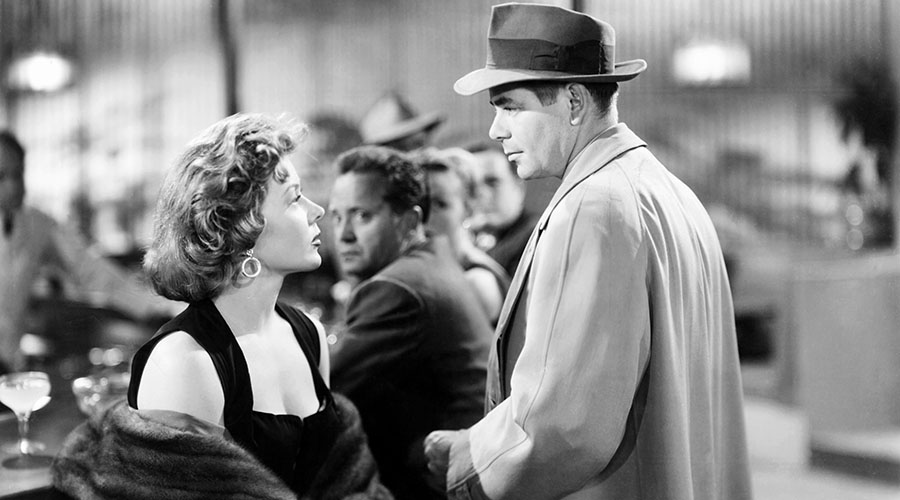
Screening: Saturday, April 20 at Chinese Multiplex House 6 with Dana Delany in attendance.
Few movies depict the grueling tenacity it takes to uproot organized crime better than The Big Heat. The ever-reliable Glenn Ford stars as a good cop who sniffs something fishy about a fellow officer’s suicide and can’t leave well enough alone, embroiling himself in a web of corruption that will punish his good intentions. Gloria Grahame, fresh off an Academy Award for The Bad and the Beautiful, sauntered into the pivotal role of an enigmatic mob moll, a part originally considered for Marilyn Monroe. Fritz Lang, the genius behind German classics Metropolis and M, directed the Columbia Pictures production with a pitilessness that made its rogue copper’s crusade feel all the more righteous.
The melodrama received unanimous praise from critics, who were thrilled to see Lang in top form again after a string of comparatively anonymous work in the Hollywood system. Ford and Grahame were both singled out for applause, their mutual intensity practically singeing the screen. Tulsa King star Dana Delany will be attending the film’s TCM screening as a special guest.
“[The Big Heat] has Gloria Grahame in so amazing a performance as a gun moll that if you miss going down to see her, boy, oh boy, you are cheating yourself.” – M. Oakley Christoph, Hartford Courant, Oct. 8, 1953
The Bingo Long Traveling All-Stars And Motor Kings (1976)
Tomatometer: 87%
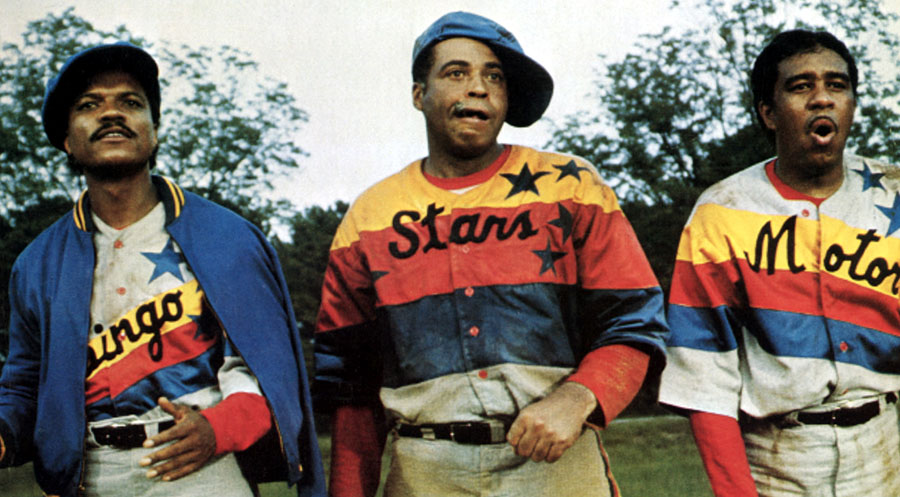
Screening: Sunday, April 21 at Chinese Multiplex House 1 with Billy Dee Williams in attendance.
Before they were immortalized in pop culture by Star Wars, Billy Dee Williams and James Earl Jones were already minting box office hits like the 1976 baseball comedy The Bingo Long Traveling All-Stars & Motor Kings. Set during the segregated era of baseball in the 1930s, it stars Williams, Jones and Richard Pryor as a band of Black players who ditch their repressive Negro League management to go it alone as a freelance team, flouting convention along the way with their showmanship on the plate. Their characters were loosely based on legendary ballplayers like Satchel Paige, Leon Carter, and Charlie Grant.
Bingo Long hit a home run with critics, who singled out Williams and Jones’ chemistry as the picture’s greatest asset. Williams acknowledged in interviews that while the film was a romp, it was also a tip of the cap to a generation of athletes whose ambitions were often thwarted by systemic prejudice. “The characters in Bingo Long had their dreams, just like my father,” he told The Courier-Journal at the time of the film’s premiere. “And that’s what the picture is all about.” Williams will be attending the film’s TCM screening as a special guest.
“[Bingo Long is] a fine movie which gives an important recreation of our country’s past in a spirit full of hope and good cheer. When’s the last time you heard a ring of applause at the end of a movie?” – Anthony Bannon, Buffalo News, July 17, 1976
Chinatown (1974)
Tomatometer: 98%
Screening: Sunday, April 21 at TCL Chinese Theatre IMAX with director Carl Franklin in attendance.
Screenwriter Robert Towne was saturated in Raymond Chandler novels and the history of his hometown Los Angeles when he conceived Chinatown, a detective story probing the shadow games that decided control over the city’s most precious resource: water. The script attracted cream-of-the-crop talent in director Roman Polanski and stars Jack Nicholson and Faye Dunaway, but it did not translate into a smooth production. Shooting Chinatown was, by all accounts, torturous, the huge personalities of everyone involved leading to frequent on-set clashes. All the while, Polanski and Towne never stopped arguing over the all-important ending.
Remarkably, the creative differences and interpersonal spats never diminished the end result. Chinatown was heralded on arrival as an instant classic, its fusion of film noir and contemporary grit intoxicating critics as well as the Academy, who recognized the film with a whopping 11 nominations. As for any hard feelings between the cast and crew? “Forget it, Jake. It’s Hollywood.” Devil in a Blue Dress director Carl Franklin will be attending the TCM screening as a special guest.
“In its total recapturing of a past, in its plot, its vivid characterizations, its carefully calculated and accelerating pace, its whole demonstration of a medium mastered, Chinatown reminds you again that motion pictures are larger, not smaller than life.” – Charles Champlin, Los Angeles Times, June 21, 1974
Close Encounters of the Third Kind (1977)
Tomatometer: 90%
Screening: Friday, April 19 at TCL Chinese Theatre with director Steven Spielberg and UCLA Professor Howard Suber in attendance.
When 30-year-old Steven Spielberg finally unveiled his mysterious third theatrical feature in the fall of 1977, he had a tough act to follow. Not only was he trying to meet the bar set by his own smash hit Jaws, but his new science-fiction epic was arriving mere months after Star Wars, directed by close friend George Lucas, became a worldwide phenomenon.
Critics couldn’t resist comparing the two projects, but it turned out there was plenty of love to go around. Even with sky-high expectations, Close Encounters of the Third Kind was both a critical and box office sensation. Spielberg’s optimistic tale of humanity’s first contact with extraterrestrials was hailed as a visual masterpiece; even the naysayers were wowed by Douglas Trumbull’s dazzling special effects. Beyond the bravura technique, though, the film’s core hopefulness resonated with an audience who had grown weary of cynicism at the cinema. Spielberg garnered his first directorial nomination at the Oscars for his trouble. He will be in attendance at Close Encounters of the Third Kind’s TCM screening as a special guest along with film scholar Howard Suber.
“There is no better indication of how far movies have progressed in 75 years than this awe-inspiring, magical foray into the worlds of science fiction and science fact.” – Dale Pollock, Santa Cruz Sentinel, Dec. 21, 1977
Dog Day Afternoon (1975)
Tomatometer: 96%
Screening: Saturday, April 20 at the Egyptian Theatre with actor Jeff Daniels in attendance.
It was a true story stranger than fiction: a Brooklyn bank robbery that quickly devolved into a hostage situation, with its mastermind John Wojtowicz turning negotiations into a public spectacle. What’s more, the robber professed to have done it all for love, claiming he had planned to use the loot for his partner’s sexual reassignment surgery. Perversely, Wojtowicz became something of a folk hero by failing spectacularly as a criminal.
It only took three years for the standoff to be recreated on screens with some light embellishments courtesy of Sidney Lumet and Al Pacino, a director-star team fresh off another ripped-from-the-headlines success, the cop drama Serpico. They had outdone themselves: Dog Day Afternoon was a critical sensation, earning Lumet kudos for locating both the comedy and tragedy inherent in the peculiar true crime tale. Pacino, meanwhile, received some of the most effusive plaudits of his career for his frenzied portrayal of Wojtowicz, renamed Sonny Wortzik for the film. Dog Day Afternoon was a box office hit and garnered six Oscar nominations, taking home a trophy for Frank Pierson’s screenplay. Actor Jeff Daniels will be attending its TCM screening as a special guest.
“By turns manically funny, slyly terrifying and strangely provocative, it somehow reaches beyond its format to make startling comment on the rampant panic of contemporary life.” – Kevin Kelly, Boston Globe, Oct. 11, 1975
Jailhouse Rock (1957)
Tomatometer: 67%
Screening: Friday, April 19 at Chinese Multiplex House 4 with director Allison Anders in attendance.
Elvis Presley’s career had reached a fever pitch by 1957. The shimmying singer had ignited a culture war, his unbridled sexuality on the stage enthralling a generation of young people while making their parents shake their heads. He had also just broken into movies, taking initial baby steps with clean cut roles in musicals like Love Me Tender. Jailhouse Rock, his third picture, marked the first time he got to be a little dangerous on the screen. The MGM production starred Elvis as a prison convict who finds stardom behind bars, bringing the jailhouse down with the film’s titular song. The production was shot on the quick and ended in tragedy when Elvis’ co-star, Judy Tyler, died in an automobile accident days after picture wrap. Elvis was so grief-stricken that he skipped out on the film’s premiere.
While critics greeted Jailhouse Rock skeptically, many noted that Elvis was improving as an actor and had finally found a vehicle tailored to his strengths. Even the naysayers conceded that their objections would do little to dissuade Elvis’ fans, and they were right: The picture made a tidy profit and spun off a hit record. Director and film scholar Allison Anders will be attending it’s TCM screening as a special guest.
“Jailhouse Rock is an astute offering for Presley… It looks very much like an important step in a scheme to let Elvis ‘level off’ into a ballad singer who will be on the scene for a long time to come.” – Dick Banks, Charlotte Observer, Oct. 30, 1957
La Strada (1954)
Tomatometer: 97%
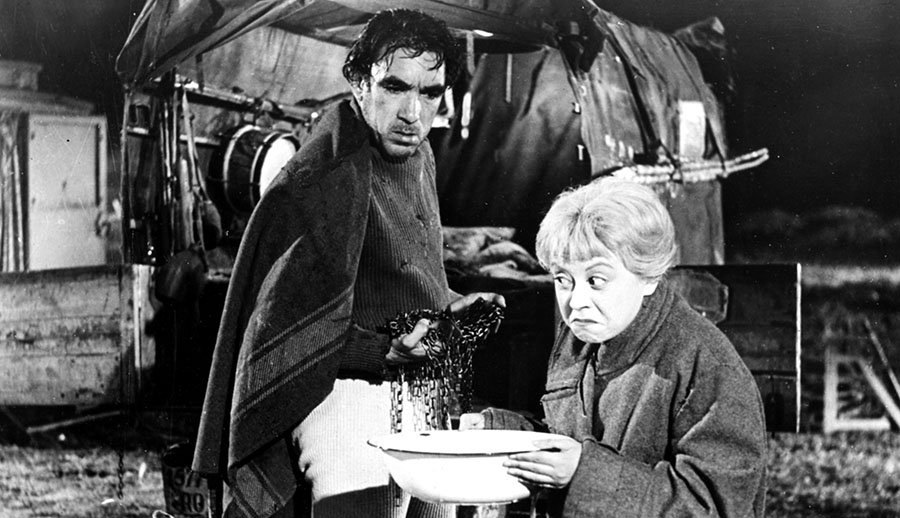
Screening: Saturday, April 20 at Chinese Multiplex House 6 with director Mike Newell in attendance.
Federico Fellini hadn’t yet become the ringleader of cinematic carnivals he’s remembered for today when he began formulating La Strada, but the project marked his first decisive step towards that creative evolution. Drawing inspiration from his wife Giulietta Masina, he developed the story of a pure-hearted girl sold to a circus strongman (played by Anthony Quinn), both of them scraping by while traveling along an unforgiving road. When investors resisted casting Masina as the protagonist, Fellini opted to start production without secure funding rather than cast somebody else.
Fellini’s gamble on his vision seemingly failed to pay off when the film premiered to scornful reactions at the 1954 Venice Film Festival. At the height of neorealism’s popularity in the Italian film industry, Fellini had made something unfashionable: a fable. However, by the time La Strada made its way to the United States in 1956, it had accumulated a groundswell of critical appreciation. American tastemakers were bowled over by the simple movie’s complex humanity, and it won the first-ever Oscar for Best Foreign Language Film. Four Weddings and a Funeral director Mike Newell will be attending the film’s TCM screening as a special guest.
“There is a tenderness and pity in almost every scene which cannot be defined in words. That is the miracle of Federico Fellini’s direction.” – Arthur Steele, Birmingham Mail, Jan. 18, 1957
Lady Sings the Blues (1972)
Tomatometer: 72%
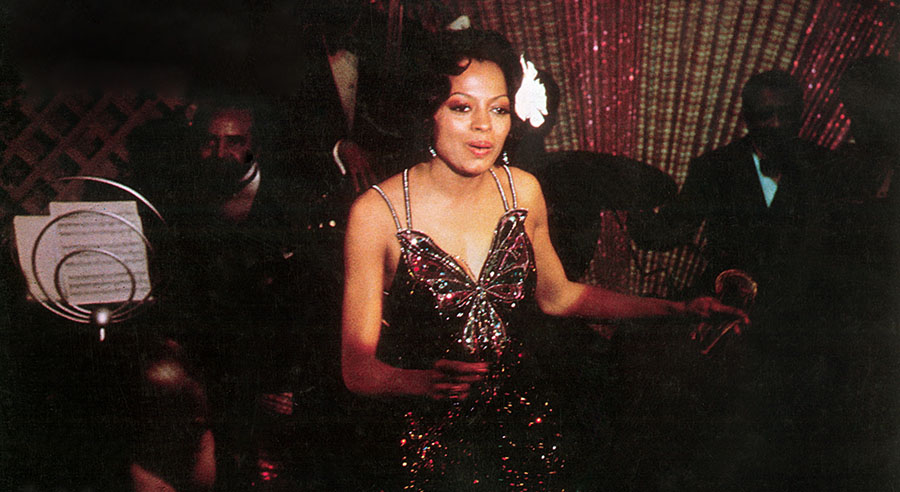
Screening: Friday, April 19 at Chinese Multiplex House 1 with Billy Dee Williams in attendance.
Lady Sings the Blues marked a convergence of two musical icons. Based on the ghostwritten autobiography of Billie Holiday, the legendary jazz singer who succumbed to substance abuse at 44 years old, the film was parlayed into a Hollywood launching pad for The Supremes alum Diana Ross by executive producer and Motown mastermind Berry Gordy. Ross viewed the assignment with trepidation. “If I had made the decision instead of my management on what was to have been my first film, I think I would have chosen something a little bit easier than playing Billie Holiday,” she told The Cincinnati Post at the time. She was paired with the suave Billy Dee Williams, playing an amalgamation of Holiday’s three husbands.
The musical biopic was a big box office success, garnering generally positive reviews with some caveats. Many critics took issue with the film’s tidy treatment of Holiday’s troubles but were unanimous in singing Ross’ praises. The film earned her an Oscar nomination for Best Actress while launching Williams as a sex symbol, the press dubbing him the new Clark Gable. Williams will be attending the TCM Fest screening as a special guest.
“Apart from the extraordinarily camera-wise charisma of Diana Ross, Lady Sings the Blues is graced by a mumbly-magical performances by Richard Pryor as Piano Man… and by the ultra leading man stability of Billy Dee Williams.” – Andrew Sarris, Village Voice, Nov. 23, 1972
Little Women (1994)
Tomatometer: 92%
Screening: Saturday, April 20 at Chinese Multiplex House 1 with stars Trini Alvarado, Eric Stolz, Samantha Mathis and screenwriter Robin Swicord in attendance.
Every generation deserves their own Little Women. It’s a testament to the evergreen charm of Louisa May Alcott’s novel that it has inspired seven film adaptations without diminishing returns. While most dramatizations of the March sisters are worth seeking out, My Brilliant Career director Gillian Armstrong’s crack at bat in 1994 might just might be the nearest and dearest to Gen-X and millennial hearts. Starring Winona Ryder, Kirsten Dunst, Claire Danes, Susan Sarandon and Christian Bale, among others, this rendition was the first to foreground the feminism inherent in the text.
The film had a warm reception, critics embracing it as intelligent drama fit for the whole family. Ryder received commendations for her performance as the strong-willed Jo, clinching an Academy Award nomination for Best Actress in a career highlight. Ironically, Little Women struggled to get made in the first place, many studios declining to greenlight it for fear it was too feminine to be a moneymaker. It went on to gross nearly $130 million at the box office, adjusted for inflation. Little Women’s screenwriter Robin Swicord and cast members Trini Alvarado, Eric Stoltz and Samantha Mathis will be attending the TCM screening as special guests.
“[Director Gillian] Armstrong and her team have made it an A-movie blubfest, a sisterhood fairy tale set in an almost operatic world of heightened emotional drama. The film feels both nicely dated and timeless at the same time.” – Anna Maria Dell’oso, Sydney Morning Herald, March 30, 1995
North by Northwest (1959)
Tomatometer: 97%
Screening: Saturday, April 20 at TCL Chinese Theatre IMAX with director Nancy Meyers in attendance.
Alfred Hitchcock once said, “Some films are slices of life, mine are slices of cake.” In that context, North by Northwest is the most decadent gateau in the legendary director’s filmography. Starring Cary Grant as a poor fellow in over his head when he’s mistaken for a secret agent, and Eva Marie Saint as the femme fatale who may or may not be aiding him, it was a lark made with the utmost moviemaking craft.
It was also the kind of success that prompts Hollywood to pop the champagne. Scripted with the precision of a luxury watch by Ernest Lehman and shot in ravishing VistaVision, North by Northwest was embraced by critics as a return to form for Hitchcock after the disappointing response to his now-cherished Vertigo. Audiences agreed and made the espionage romp a box office hit. A new 4K restoration will premiere at TCM Fest with director Nancy Meyers as a special guest.
“Alfred Hitchcock’s new thriller, North by Northwest, is one of those no holds barred films. For better than two hours, he lets the Technicolor melodrama ramble across the VistaVision screen while gleefully setting traps for his hero.” – Barbara L. Wilson, Philadelphia Inquirer, Aug. 17, 1959
Pulp Fiction (1994)
Tomatometer: 92%
Screening: Thursday, April 18 at TCL Chinese Theatre IMAX with stars John Travolta, Samuel L. Jackson and Uma Thurman in attendance for a special conversation.
When John Travolta met with upstart filmmaker Quentin Tarantino on a professional playdate arranged by his agent, he had been stuck in a career rut for nearly a decade. While they played board games branded from past glories like Saturday Night Fever, Tarantino bluntly told Travolta he had squandered his talent but vowed to resurrect the actor’s movie stardom. He had just the project in mind: a vampire western that would go on to become From Dusk Till Dawn. Travolta was baffled by the pitch but expressed interest in Tarantino’s other percolating script, Pulp Fiction. Unfortunately, Tarantino had already reserved the leading role of Vincent Vega for Michael Madsen, one of the stars of his debut feature Reservoir Dogs.
Several months later, Tarantino changed his mind and offered Travolta the part. The decision paid off handsomely for the both of them: Pulp Fiction was an era-defining success, garnering Tarantino the coveted Palme d’Or at the Cannes Film Festival and restoring Travolta to the Hollywood A-List. Travolta, along with co-stars Samuel L. Jackson and Uma Thurman, will participate in a special conversation at the film’s TCM screening, with several other members of the cast and crew also in attendance.
“A truly great soundtrack keeps the tone hip and even steals a scene or two. Not that Tarantino doesn’t have plenty to spare. Pulp Fiction is riveting filmmaking funny, visceral, stylish and so unabashedly original that you never want it to end.” – Marylynn Uricchio, Pittsburgh Post-Gazette, Oct. 14, 1994
Seven (1995)
Tomatometer: 83%
Screening: Friday, April 19 at TCL Chinese Theatre IMAX with director David Fincher in attendance.
The infamous climax of Seven remains so iconic that it’s hard to believe it almost didn’t happen. When record store clerk Andrew Kevin Walker attracted Hollywood’s attention with his screenplay about a murder spree inspired by the seven deadly sins, executives balked at the fatalistic ending and insisted he tone it down. By a twist of fate, an early draft including Walker’s intended finale was mistakenly sent to David Fincher, a hotshot from the music video world still licking his wounds after the rocky production of his debut feature, Alien³. Fincher agreed to direct the project on the condition that they stick with the original twist.
The finished product scandalized critics, some charging that Fincher and co. had gone too far. Most, however, were riveted by Seven’s uncompromising construction. The grisly procedural was an unexpected box office hit and catapulted Fincher from Mr. MTV to the directorial A-list. He will be attending the film’s TCM screening as a special guest.
“Fincher’s suffocatingly dark style is the perfect fit for Seven: The gloomy, nightmarish images communicate a fear that the characters’ dialogue cannot, and if Seven haunts your dreams, it’s thanks to Fincher’s post-modern eye.” – Rene Rodriguez, Miami Herald, Sept. 22, 1995
The Searchers (1956)
Tomatometer: 87%
Screening: Sunday, April 21 at The Egyptian Theatre with director Alexander Payne in attendance.
It wouldn’t be a reach to say that much of 20th century America’s conception of itself was molded by the pairing of John Ford and John Wayne. The director and star worked together on over a dozen films that traversed multiple genres, but it was their Westerns that lingered in the public imagination. The Searchers marked their ninth — and arguably most atypical — collaboration. Starring Wayne and Jeffrey Hunter as uneasy relatives on a long quest to retrieve their kin from a Comanche tribe, the film complicated the genre’s formula by making Wayne’s hero a hateful man motivated by vengeance.
The Searchers premiered to solid if unspectacular reviews, with some critics miffed by its languorous pace. It was a financial success but received zero Academy Award nominations, chalked up as another good effort from a team known for greatness. In the ensuing decades, however, The Searchers came to be regarded as the duo’s signature achievement, often cited as one of the greatest films ever made. Martin Scorsese, an avowed admirer, perhaps summed up the picture’s slow-burn appeal best: “Like all great works of art, it’s uncomfortable.” TCM Fest will be uneveiling a new restoration of the film with director Alexander Payne as a special guest.
“Ford has achieved an extraordinary effect. There is the sense of time passing, yet the picture never drags. There is continued action, yet the picture conveys in almost leisurely fashion the life of isolated families in the remote early West.” – Helen Bower, Detroit Free Press, May 19, 1956
The Shawshank Redemption (1994)
Tomatometer: 89%
Screening: Saturday, April 20 at TCL Chinese Theatre IMAX with stars Morgan Freeman and Tim Robbins in attendance.
The Shawshank Redemption was a sleeper in every way. It was a tough sell from the jump, extrapolating a whole movie from one of Stephen King’s few non-horror short stories and helmed by rookie director Frank Darabont, who had cut his teeth writing for television. There was also that pesky name and premise. “Not only is the title horrendous, it’s a 2½-hour movie that takes place in prison,” Jeff Simon of The Buffalo News assessed.
Yet Simon’s review was glowing, as were most of the reactions. Some detractors dismissed the prison picture as too old-fashioned, but most were enthralled by the story’s hard-earned uplift, with unanimous praise given to Morgan Freeman and Tim Robbins’ soulful performances. The film fizzled at the box office but surprised with seven Academy Award nominations, garnering no wins. However, much like its wrongly convicted hero Andy Dufresne, time would be a great vindicator for The Shawshank Redemption. An omnipresent run on cable over the next decade cemented it as a modern classic and one of the most enduringly popular films of all time. Both Freeman and Robbins will be attending its TCM screening as special guests.
“The Shawshank Redemption is both resigned and inspirational, grittily realistic and vaguely surreal, matter-of-fact and operatic. Somehow, these opposites are combined into a remarkably smooth and lyrical composition.” – Jay Boyar, Orlando Sentinel, Oct. 7, 1994
Sherlock, Jr. (1924)
Tomatometer: 86%
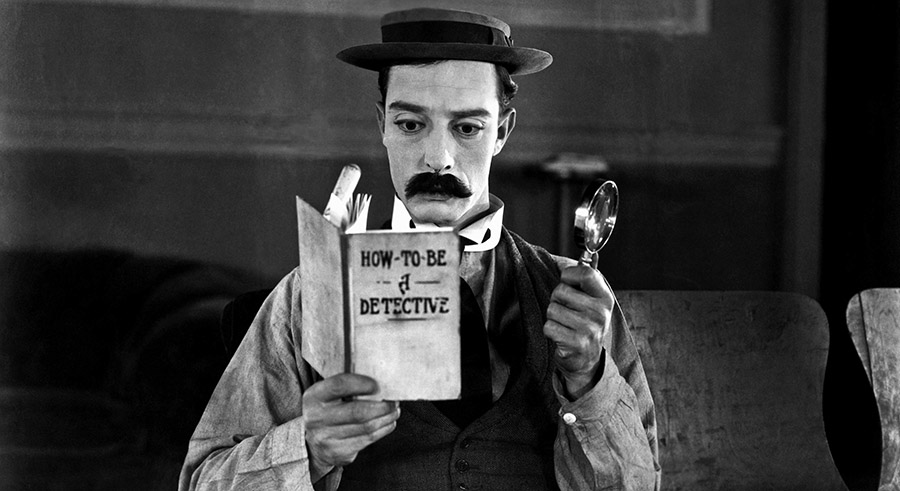
Screening: Sunday, April 21 at The Egyptian Theatre with the Mont Alto Motion Picture Orchestra providing musical accompaniment.
Renowned for his ghostly poker face and death-defying stuntwork, Buster Keaton was one of the most meticulous entertainers of the silent era. For his third directorial feature, he spun a whole story from one of his daydreams: the image of him walking through a theater screen and entering a movie. To depict his projectionist character’s sleuthing adventures through a cinema wonderland, Keaton and his crew pioneered boundary-pushing optical effects. The complicated production proved especially hazardous for Keaton, who fell off a train during one stunt scene gone awry and hit a rail on the way down. He would essentially walk the injury off, only to learn years after the fact that he’d broken his neck.
All that blood, sweat, and tears were met with an underwhelming reaction when the film debuted. Reviews were generally positive, praising the movie’s visual ingenuity, but audiences had expected a more straightforwardly funny film. Keaton himself didn’t even regard it as a standout in his filmography. A century later, Sherlock Jr. is widely recognized as a landmark in visual effects and one of the silent era’s crown jewels. TCM Fest will be celebrating its 100th Anniversary with live musical accompaniment by the Mont Alto Motion Picture Orchestra.
“It is packed with laughable incidents, ridiculous tricks that will cause roars of real belly-laughs, and will send them home just a bit ashamed at having laughed so much, just as it did this reviewer.” – Herman Shumlin, Billboard, May 17, 1924
The Silence of the Lambs (1991)
Tomatometer: 95%
Screening: Friday, April 19 at TCL Chinese Theatre IMAX with star Jodie Foster in attendance.
The Silence of the Lambs’ Oscars success was an anomaly. Virtually nothing about it had the pedigree of a traditional nominee, let alone winner. Adapting the second entry in Thomas Harris’ bestselling Hannibal Lecter novels, its unflinching gore and digressions into psychopathy were the stuff of horror, a genre the Academy had historically ignored. It was released at the very beginning of 1991, long before the holiday months typically reserved for awards season hopefuls. Its distributor, Orion Pictures, was heading into bankruptcy. As far as trophies go, the serial killer thriller was an underdog, albeit one fitted with a muzzle and straightjacket.
It was, however, met with rapturous reviews, hailed for bringing a sophisticated psychological dimension to a genre often written off as exploitative. The critical darling was also a massive box office success, but a Best Picture prize still seemed difficult to imagine. Yet it went on to sweep the main categories on Oscar night, taking home the top accolade and additional trophies for Anthony Hopkins, Jodie Foster and director Jonathan Demme. Everything about it should have damned its awards chances, but The Silence of the Lambs defied the odds with a very simple trump card: It was damn good. Jodie Foster will be attending its TCM screening as a special guest.
“The Silence of the Lambs is the stuff that nightmares are made of. It is, in a sense, a horror movie, but one that deserves comparison with such great works of psychological terror as The Shining, Psycho and Rosemary’s Baby.” – Harper Barnes, St. Louis Post-Dispatch, Feb. 15,1991
The Shop Around the Corner (1940)
Tomatometer: 99%
Screening: Saturday, April 20 at Chinese Multiplex House 1 with director Rian Johnson in attendance.
With a keen eye for the little details that could elevate a joke like a magic trick, director Ernst Lubitsch brought such a deft hand to his comedies that the marketing phrase “The Lubitsch Touch” was a household name during the Golden Age of Hollywood. The Shop Around the Corner’s premise was so perfectly tailored to the director’s particular touch that he could’ve worn it like a glove. Based on the 1937 play Parfumerie, it told the story of feuding co-workers who unwittingly fall in love as anonymous penfriends. Jimmy Stewart and Margaret Sullavan played the two bickering lovebirds, their onscreen rapport already fully formed after previously starring together in romances like The Shopworn Angel.
The Shop Around the Corner received universal acclaim upon release. Critics, many of whom couldn’t resist commenting on the film’s light “touch,” fell in love at first sight. The Shop Around the Corner remains one of the most influential romantic comedies of all time, famously receiving a spiritual and technologically-updated successor in Nora Ephron’s You’ve Got Mail half a century later. Knives Out writer-director Rian Johnson will be attending the film’s TCM screening as a special guest.
“It’s a simple but effective comedy-drama, telling a very human story… Director Lubitsch has put on a lot of his characteristic comedy touches but he has also woven plenty of dramatic interludes into the picture.” – James T. Hamada, The Nippu Jiji (Honolulu), Feb. 20, 1940
Spaceballs (1987)
Tomatometer: 52%
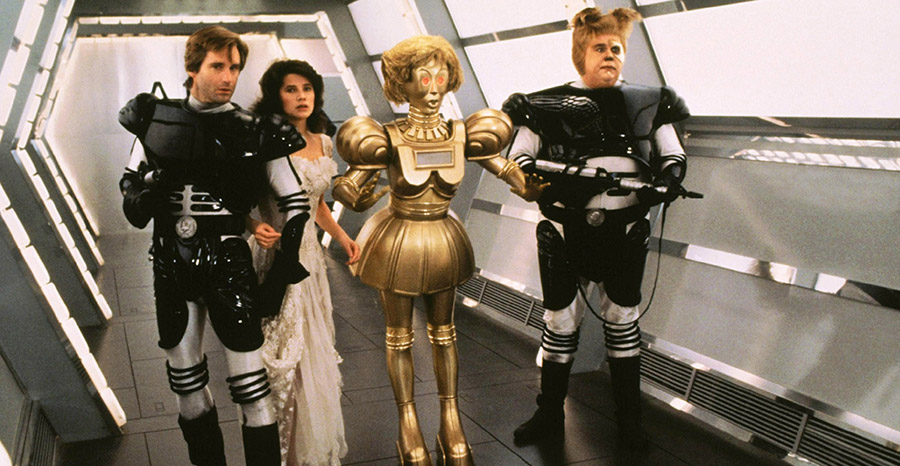
Screening: Sunday, April 21 at TCL Chinese Theatre IMAX with director Mel Brooks in attendance.
Mel Brooks cemented his legend as the great lampooner of genre with his prodigious run in the 1970s, his high-concept comedies affectionately ribbing MGM Westerns, Universal horror, and even Alfred Hitchcock’s ouvre. By the 1980s he had slowed down in the director’s chair to focus on producing, taking a six-year break from the parodies before finally setting his irreverent sights on the biggest franchise of them all, Star Wars. Securing George Lucas’ blessing by agreeing not to merchandise the picture, Brooks played several characters in the farce, the cast rounded out by comedy stars John Candy and Rick Moranis along with relative unknowns Bill Pullman and Daphne Zuniga.
Spaceballs was a bonanza of silliness, gleefully mocking everything sci-fi while functioning as an adventure story in its own right. The initial reception was mixed; critics were ready to move on from Star Wars and compared the picture unfavorably to Brooks’ past work. George Lucas was a fan, though, and over time, the sci-fi comedy became Brooks’ most broadly popular movie. “By far the most letters I get are from people who love Spaceballs,” he told Entertainment Weekly. The 97-year-old legend will be attending the film’s TCM screening as a special guest.
“This sendup by director Mel Brooks incorporates the silliest aspects of all the major space adventures of the last decade, and the whole is a hilarious combination of its parts.” – Cathy Burke, United Press International, July 3, 1987
Westward the Women (1951)
Tomatometer: 69%
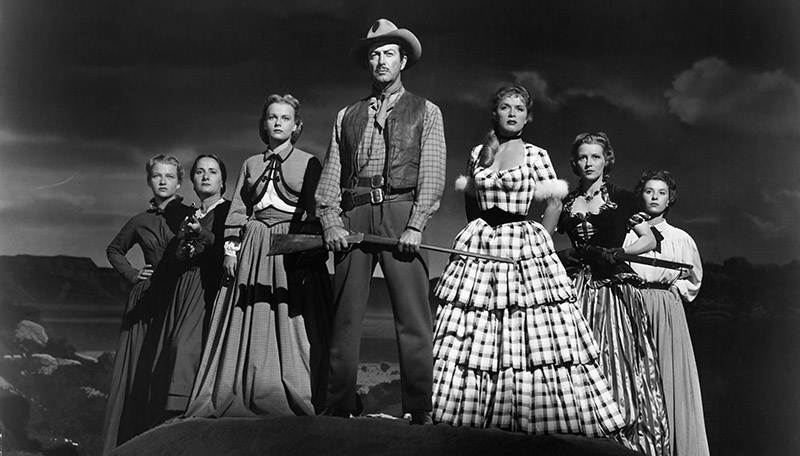
Screening: Saturday, April 20 at The Egyptian Theatre, preceded by a special honor for film scholar Jeanine Basinger.
When legendary director Frank Capra flirted with idea of making a Western, he thought up of a neat twist to the genre’s formula: a wagon trail adventure where most of the adventurers were women. He eventually passed the concept on to his personal friend, director William A. Wellman, with Charles Schnee fleshing out the script. The result was Westward the Women, an oddball oater starring the dashing Rob Taylor as a misogynistic trail guide tasked with escorting over 100 women from Chicago to a town full of lonely homesteaders in California. When the caravan loses most of its trail hands during the journey, the women step up to help brave the travails of the wild, challenging their guide’s dismissive attitude of the opposite sex. What’s more, Taylor’s character meets his match in one of his charges, a strong-willed showgirl played by Denise Darcel.
The picture was a modest success both critically and financially, receiving kudos for bringing some fresh wrinkles to an increasingly homogenous genre. Today, Westward the Women stands out as one of the few 1950s westerns that acknowledged women’s agency.
“All the parts in the film are well played, under William Wellman’s direction. The latter has a way of making these pictures of the old West come alive. He gives each scene a touch of realism that heightens the illusion of the story.” – Kate Cameron, New York Daily News, Jan. 1, 1952
The TCM Classic Film Festival runs from April 18-21, 2024.
By Rob Fowler
Archival curation for this feature was led by Tim Ryan. Additional review curation by Robert Fowler, Dom, and Jeff Giles.

